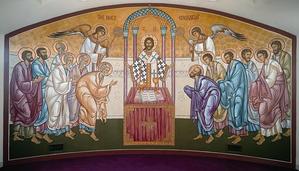
On the Reception of Holy Communion
From the Orthodox Study Bible:
Who May Receive Holy Communion in the Orthodox Church?
Orthodox Christians fully participate in the celebration of the Liturgy when they receive the body and blood of the Lord Jesus in Holy Communion, as the Lord himself commands (John 6: 53). To receive Communion in the Orthodox Church, one must be a practicing Orthodox Christian; this means that you must be baptized and/or chrismated in the Orthodox Church and that your beliefs and lifestyle are in accordance with the teachings of the Church.
In order to be properly prepared for this encounter with Christ, those seeking to receive Communion should not be conscious of grave sin, having opened their hearts with prayer, fasted appropriately and lived with charity and love towards their neighbors. Because, as the Apostle Paul teaches, it is possible to receive the body and blood of the Lord “in unworthy manner” and actually be “sinning against the body and blood of the Lord” (1 Corinthians 11:27-30), those who are aware of grave sin in their lives should confess their sins and be reconciled to Christ and His Church by participating in the sacrament of confession before approaching the chalice to receive Communion. Frequent reception of the body and blood of Christ – at every Liturgy, if possible – is encouraged for all Orthodox Christians.
We welcome those Christians not fully united with us in faith and life to this celebration of the Liturgy. Unfortunately, the guidelines offered above exclude those who are not of the Orthodox faith from the reception of Communion. This is a sad and painful consequence of the divisions that exist within Christianity. Because we believe the reception of Communion to be an action of the celebrating community that signifies a oneness of faith, life and worship, the reception of Communion by Christians not fully united with us would imply a unity that does not yet exist in reality. We pray that these divisions will lessen and finally disappear, in keeping with Christ’s prayer for His disciples “that they may all be one” (John 17:21).
The Scriptural Teaching on the Meaning of Holy Communion
The Lord Jesus said: “I am the bread of life. Whoever comes to me will never be hungry and whoever believes in me will never be thirsty. I am the living bread which came down from heaven. If anyone eats of this bread, they will live forever, and the bread which I shall give for the life of the world is my flesh. Amen, amen, I say to you: unless you eat the flesh of the son of man and drink His blood, you have no life in you. Those who eat my flesh and drink my blood have eternal life and I will raise them up on the last day. For my flesh is real food and my blood is real drink. Those who eat my flesh and drink my blood abide in me and I in them. Just as the living Father sent me and I live because of the Father, so whoever eats me will live because of me.” – John 6:35, 51, 53-57
The Apostle Paul said: “The cup of blessing which we bless: it not a participation in the blood of Christ? The bread which we break: is it not a participation in the body of Christ? Because there is one bread, we who are many are one body, for we all partake of the same loaf. – 1 Corinthians 10:16-17
From the Orthodox Study Bible:
Who May Receive Holy Communion in the Orthodox Church?
Orthodox Christians fully participate in the celebration of the Liturgy when they receive the body and blood of the Lord Jesus in Holy Communion, as the Lord himself commands (John 6: 53). To receive Communion in the Orthodox Church, one must be a practicing Orthodox Christian; this means that you must be baptized and/or chrismated in the Orthodox Church and that your beliefs and lifestyle are in accordance with the teachings of the Church.
In order to be properly prepared for this encounter with Christ, those seeking to receive Communion should not be conscious of grave sin, having opened their hearts with prayer, fasted appropriately and lived with charity and love towards their neighbors. Because, as the Apostle Paul teaches, it is possible to receive the body and blood of the Lord “in unworthy manner” and actually be “sinning against the body and blood of the Lord” (1 Corinthians 11:27-30), those who are aware of grave sin in their lives should confess their sins and be reconciled to Christ and His Church by participating in the sacrament of confession before approaching the chalice to receive Communion. Frequent reception of the body and blood of Christ – at every Liturgy, if possible – is encouraged for all Orthodox Christians.
We welcome those Christians not fully united with us in faith and life to this celebration of the Liturgy. Unfortunately, the guidelines offered above exclude those who are not of the Orthodox faith from the reception of Communion. This is a sad and painful consequence of the divisions that exist within Christianity. Because we believe the reception of Communion to be an action of the celebrating community that signifies a oneness of faith, life and worship, the reception of Communion by Christians not fully united with us would imply a unity that does not yet exist in reality. We pray that these divisions will lessen and finally disappear, in keeping with Christ’s prayer for His disciples “that they may all be one” (John 17:21).
The Scriptural Teaching on the Meaning of Holy Communion
The Lord Jesus said: “I am the bread of life. Whoever comes to me will never be hungry and whoever believes in me will never be thirsty. I am the living bread which came down from heaven. If anyone eats of this bread, they will live forever, and the bread which I shall give for the life of the world is my flesh. Amen, amen, I say to you: unless you eat the flesh of the son of man and drink His blood, you have no life in you. Those who eat my flesh and drink my blood have eternal life and I will raise them up on the last day. For my flesh is real food and my blood is real drink. Those who eat my flesh and drink my blood abide in me and I in them. Just as the living Father sent me and I live because of the Father, so whoever eats me will live because of me.” – John 6:35, 51, 53-57
The Apostle Paul said: “The cup of blessing which we bless: it not a participation in the blood of Christ? The bread which we break: is it not a participation in the body of Christ? Because there is one bread, we who are many are one body, for we all partake of the same loaf. – 1 Corinthians 10:16-17
